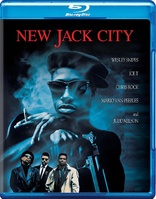New Jack City Blu-ray Movie
HomeNew Jack City Blu-ray Movie 
Warner Bros. | 1991 | 100 min | Rated R | Aug 14, 2012Movie rating
7.1 | / 10 |
Blu-ray rating
| Users | 4.3 | |
| Reviewer | 4.0 | |
| Overall | 4.2 |
Overview
New Jack City (1991)
In the poverty-stricken slums of 1980s New York, ruthless "New Jack" gangster Nino Brown and his Cash Money Brothers build a criminal empire selling crack, while NYPD Lt. Stone forms an undercover unit of misfits to infiltrate the gang and bring it down.
Starring: Wesley Snipes, Ice-T, Allen Payne, Chris Rock, Mario Van PeeblesDirector: Mario Van Peebles
| Crime | 100% |
| Thriller | 9% |
| Drama | Insignificant |
Specifications
Video
Video codec: MPEG-4 AVC
Video resolution: 1080p
Aspect ratio: 1.78:1
Original aspect ratio: 1.85:1
Audio
English: DTS-HD Master Audio 5.1 (48kHz, 24-bit)
French: Dolby Digital 2.0
German: Dolby Digital 2.0
Spanish: Dolby Digital 2.0
Spanish: Dolby Digital 2.0
Portuguese: Dolby Digital Mono
Spanish: Latin and Castilian
Subtitles
English SDH, French, German SDH, Portuguese, Spanish
Discs
50GB Blu-ray Disc
Single disc (1 BD)
Playback
Region free
Review
Rating summary
| Movie | 4.5 | |
| Video | 4.0 | |
| Audio | 4.0 | |
| Extras | 4.0 | |
| Overall | 4.0 |
New Jack City Blu-ray Movie Review
No Hope, No Change
Reviewed by Michael Reuben August 19, 2012Mario Van Peebles didn't have the budget to rival The Godfather or Scarface when he made New Jack City, but he had ambition, talent and experience directing TV—and they took him a long way. Just as crucial, though, was the remarkable cast he assembled, only one of which (former Brat Packer Judd Nelson) was a familiar face at the time. Many of the film's ensemble would go on to major careers, especially Wesley Snipes, whose mesmerizing portrayal of Harlem drug lord Nino Brown both thrilled and intimidated audiences. (Snipes's recent tax troubles notwithstanding, he will be back on the screen someday, and I doubt he'll have lost any of his movie star charisma.) As NYPD Lt. Stone, Van Peebles says he needs to find "New Jack cops" to confront the city's crack epidemic. As the film's director, Van Peebles wanted a New Jack crime epic to portray a different breed of gangster. He succeeded so effectively that, along with John Singleton's Boyz in the Hood released the same year, New Jack City convinced studio executives that films anchored by African-American casts could be worthwhile investments. Mainstream cinema hasn't looked the same since. Van Peebles earned a degree in economics from Columbia and served on New York City Mayor Ed Koch's task force in 1979 during the city's fiscal crisis. For all the flashy camera work and aptly chosen music, his approach to the script by Thomas Lee Wright and Barry Michael Cooper reflects a grasp of the underlying bread-and-butter realities that allow a bunch of stick-up artists to become wealthy crime moguls. New Jack's Nino Brown may justify his actions with quasi-political slogans like "you gotta rob to get rich in the Reagan Era", but Van Peebles is careful to show that the people they're robbing are the poor and vulnerable. Nino and his Cash Money Brothers are no Robin Hoods, nor are they Don Corleone offering an alternative "shadow" system of law and order to an immigrant community that can't trust the police. They are what they always have been: exploiters of the weak. Their fortunes change when they ply their trade on a grand scale according to well-established capitalist principles: segmented on an assembly line, computerized and accounted for, and backed by a private army. Nino may quote Tony Montana, but the name that most inspires him is Joe Kennedy, the bootlegger turned entrepreneur—and father of a dynasty.
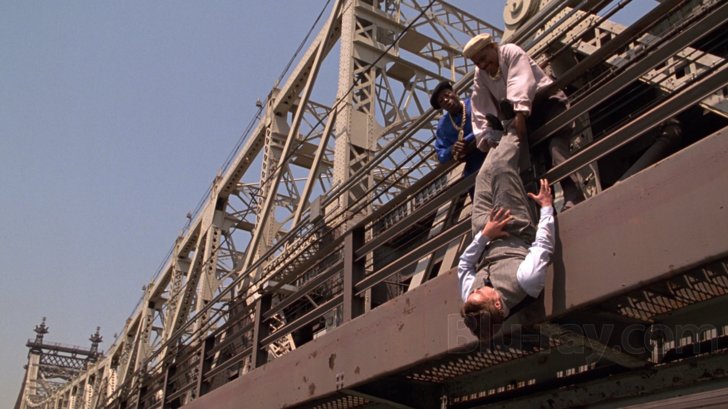
New Jack City opens with memorable establishing shots that, as Van Peebles describes in the disc's extras, were carefully planned. What at first appears to be stock footage of the Manhattan skyline photographed from a helicopter eventually narrows down to focus on several people on the pedestrian walkway of the 59th Street bridge. It's Nino Brown's chief enforcer, known as "Duh Duh Man" because of his stammer (Bill Nunn), and he's dangling a dealer who came up short head first over the side of the bridge. The dealer's girlfriend is shrieking in terror. Then a car pulls over, and out strolls Nino Brown (Snipes) in Kangol cap and flashy blue suit. He leans over the railing next to Duh Duh Man and proceeds to conduct business with the errant dealer suspended above the East River. Welcome to the world of the Cash Money Brothers ("C! M! B!"), circa 1986. In bold, quick strokes, Van Peebles lays out the worlds of his villain, Nino Brown, and his hero, undercover narcotics detective Scotty Appleton (Ice-T). At the moment, Scotty is trying to nail a mid-level dealer known as Pookie (Chris Rock) on a major buy, which leads to a frantic foot chase through Harlem (it's better than the Santa Claus chase that opens The French Connection, which Van Peebles studied for inspiration). Two important plot points are established: First, Scotty shoots Pookie in the ankle, leading him to feel responsible for the kid when he turns up a few years later as a junkie. And second, Scotty is spotted as an undercover cop by Kareem Akbar (Christopher Williams), a business major who's come uptown because he thinks Nino Brown will pay him more than Wall Street. A few years later, Kareem will recognize Scotty again, at an inopportune moment. Kareem's expertise is welcomed by Nino, whose partner, Gee Money (Allan Payne), has just persuaded him to focus their dealing activities on crack ("they be going crazy over this!"). Nino has been receiving a supplemental education in business from his rich girlfriend, Selina (Michael Michele), who obviously enjoys the thrill of dating a gangster. At a CMB meeting he unveils his plan to seize control of a local apartment building, the Carter, and transform it into a crack manufacturing and distribution center. So successful are their efforts that, by 1989, the CMB have the money and muscle to control Harlem. Even the mob, in the person of Don Armeteo (John Aprea) and his nephew, Frankie Needles (Anthony DeSando), is powerless to oppose them. But success always comes at a cost. One such cost is heightened police scrutiny in the form of a task force created by Lt. Stone (Van Peebles), despite the misgivings of the police commissioner (Thalmus Rasulala, who appears to have been doing an oblique impression of Benjamin Ward, the commissioner during that period). The task force consists of Scotty, another detective with a "bad" attitude named Nick Peretti (Nelson) and Stone's assistant, Det. Park (Russell Wong). Scotty ends up recruiting his old adversary Pookie as an undercover informant, which turns out to be a bad idea, because Pookie, though now clean, ultimately can't resist the temptation of being around drugs all day. The other major cost exacted by the CMB's success is the fracturing of the group itself. As Nino Brown becomes ever more successful, he also loses respect for the very people who helped him achieve that success. Nino may be "movin' on up", but as far as he's concerned, he's doing it alone. Eventually, even he and Gee Money part ways. By the time Nino is sitting in a courtroom under indictment, he's all alone—and that's when he pulls his wildest trick of all. Van Peebles has directed at least half a dozen feature films since New Jack City, but none of them has matched its supple narrative efficiency. Much credit is due to the script by Wright and Cooper, with its sharp dialogue and effective use of montage, but Van Peebles also deserves credit for making each shot count. The sequence depicting the CMB's takeover of the Carter, which begins with the assassination of Fat Smitty (Eek-A-Mouse), the street thug who currently controls the immediate neighborhood, is a masterpiece of visual storytelling; it compresses the entire construction of a criminal enterprise into a few minutes of screen time (to the tune of "Living for the City"). Because Van Peebles is able to make these kinds of shortcuts work for him, he's able to save enough of the film's length to give important character interactions their full weight, e.g., the confrontation between Nino and Gee Money after their partnership has fallen apart, or the encounters, in various circumstances, between Nino and Scotty. Like all the best crime dramas, New Jack City catches your attention with guns, cash and bad behavior, but it lingers in the memory because it takes the time to let its characters live and breathe on the screen.
New Jack City Blu-ray Movie, Video Quality 
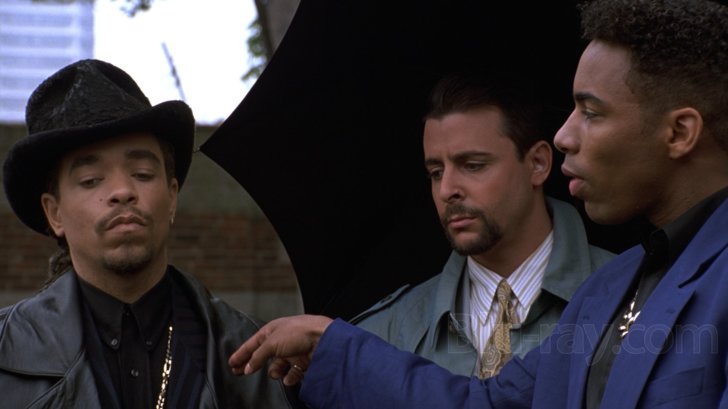
The cinematographer for New Jack City, Francis Kenny (Heathers), may not be as well known as the four fellow ASC members with whom he founded a commercial company called "5 Eyes", but his abilities are highly regarded. (The four co-founders are John Toll, Owen Roizman, Russell Carpenter and Emmanuel Lubezki.) The lighting demands of New Jack City were varied, ranging from the naturalistic urban landscape where Nino and the Cash Money Brothers ply their trade to the colorful, stylized world of the clubs where they celebrate their success and the luxurious digs that their ill-gotten gains buy them. And let's not forget the surreal drug lab, the drab rehab sessions and the crumbling police precincts. Kenny gave each environment a distinctive look, and the effect has been faithfully reproduced on Warner's 1080p, AVC-encoded Blu-ray. Colors on the street tend to be chilly and desaturated, whereas colors in clubs and at home among the CMB are bolder, brighter and stronger (with the notable exception of Gee Money's apartment after his partnership with Nino begins to deteriorate, where the colors are all cold). Clarity and detail are generally excellent, except for scenes that have been deliberately filtered for a softer image, e.g., the police commissioner's office, which is a place of politics, intrigue and fuzzy values. Blacks are solid and strong, which is important both for the scenes set at night and for the numerous dark outfits worn by many of the characters. Contrast remains at the appropriate level to bring out detail without overwhelming it. The film's grain structure is fine and natural-looking, with no indication of inappropriate tampering; nor has there been any artificial sharpening. Warner has used a BD-50, and compression artifacts are not an issue.
New Jack City Blu-ray Movie, Audio Quality 
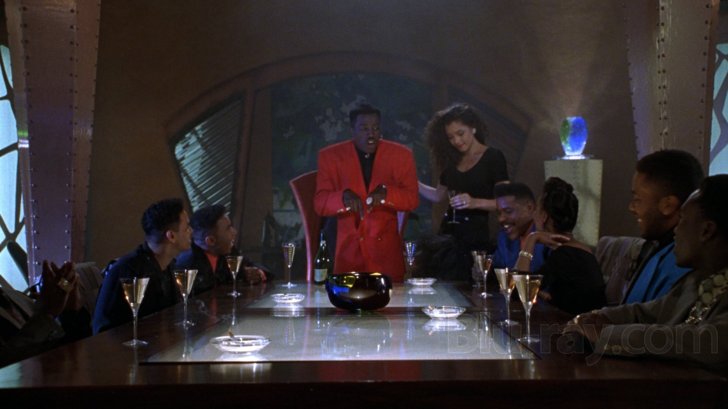
New Jack City was released to theaters in Dolby Stereo, then later remixed for 5.1 when it was first issued on DVD in 1998. The Blu-ray's DTS-HD MA 5.1 appears to be based on the same remix. It's a conservative 5.1 version, with the rear channels used only for general ambiance and to give the musical selections a more open and spacious sound. The music frequently uses distinct left and right separations, which isn't unusual for hip-hop recordings, and this was no doubt part of the original stereo mix. Voices are clear and almost always intelligible, with Ice-T the occasional exception. There is incidental underscoring by Michel Colombier, but no one ever notices it; the hip-hop, pop and blues songs that dominate the soundtrack overpower everything else.
New Jack City Blu-ray Movie, Special Features and Extras 
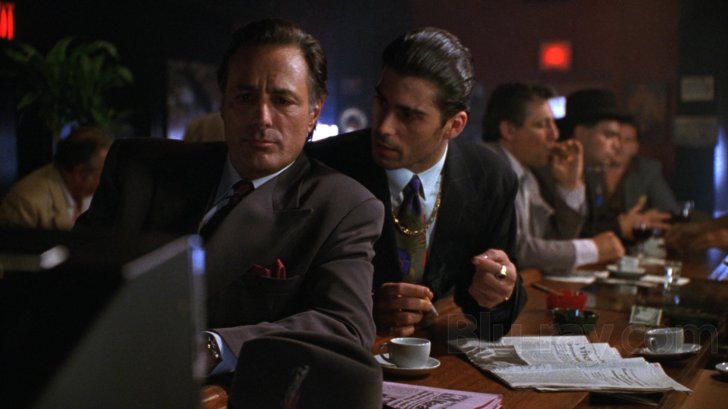
The extras have been ported over from the "special edition" two-disc DVD released in 2007 (although the documentaries bear a 2005 copyright date).
- Commentary with Director/Actor Mario Van Peebles: Much of the material in the commentary is covered in the three documentaries, but here Van Peebles speaks at greater length and links his artistic choices to the film's themes. Of particular note is his conscious effort to balance the charismatic pull of Nino Brown's ruthless gangster with an adversary, Ice-T's Scotty, who came with his own built-in appeal. Van Peebles also wanted to make sure he showed the consequences of Brown's activities through Chris Rock's Pookie and through the fact that, as Van Peebles emphasize, everyone involved with the drug trade comes to a bad end.
- The Road to New Jack City (SD; 1.85:1, enhanced; 28:13): This is a first-rate retrospective documentary on the making of the film, featuring interviews with Van Peebles, Rock, Ice-T, Nelson, Payne and producer Doug McHenry. There is a dedication at the end to producer George Jackson, who died of a stroke in 2000 at the age of 42.
- NJC: A Hip-Hop Classic (SD; 1.85:1, enhanced; 20:21): Various figures from the world of hip-hop discuss the impact and significance of the film and its soundtrack. They include: Warren G, Fab 5 Freddy, Cassandra Mills (who produced the film's soundtrack), Big Boy, Ed Lover, the group Nappy Roots, Truth Hurts, Moses Edinborough, Dr. Todd Boyd and, of course, Ice-T.
- Harlem World: A Walk Inside (SD; 1.85:1, enhanced; 10:19): Accompanied by his daughter Morgana (who recently appeared as a teenage dancer in We the Party),Van Peebles revisits some of the film's signature locations and recalls the sequences filmed in each one.
- Van Peebles Parody (SD; 1.78:1, enhanced; 1:11): Van Peebles' mock response to those who claim he borrowed too much from Scarface.
- Music Videos (SD; 1.33:1):
- "New Jack Hustler (Nino's Theme)" by Ice-T (4:30)
- "I'm Dreamin'" by Christopher Williams (4:49)
- "I'm Gonna Sex You Up" by Color Me Badd (4:13)
- Theatrical Trailer (SD; 1.78:1, enhanced; 1:58): Effective in its rapid-fire assembly of images from all over the film to create an accurate sense of its mood.
New Jack City Blu-ray Movie, Overall Score and Recommendation 
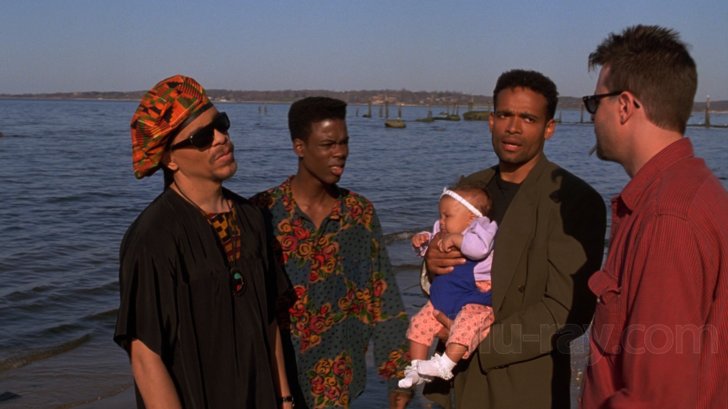
An entertaining detail emerges from Van Peebles' commentary about how he got started on the road to directing his first feature. He was introduced to Bob Daly and Terry Semel, then the heads of Warner Brothers, and vouched for as a young director with potential, by none other than Clint Eastwood, who had cast Van Peebles in the pivotal role of Corporal Stitch Jones in Heartbreak Ridge (1986). Who better than Eastwood could appreciate the desire of an ambitious young actor to get a shot at the director's chair? What makes the story especially piquant is that Eastwood was not yet regarded as the authoritative filmmaker he is today. At the time, he was still Dirty Harry, The Man with No Name and the patriotic military men of Heartbreak Ridge and Firefox—in short, the very opposite of someone you'd expect to find promoting the director of what would turn out to be a hip-hop classic. Long before the viewing public woke up to the depth and complexity of Eastwood's interests, he was leaving his iconoclastic fingerprints on unexpected areas of American cinema, including one of the 20th Century's essential crime epics. Highly recommended.
Similar titles
Similar titles you might also like

King of New York
1990

American Gangster 4K
2007

Menace II Society
Director's Cut
1993

Donnie Brasco
Extended Cut
1997

The Drop
2014

Revenge of the Green Dragons
2014

Carlito's Way 4K
1993

Lucky Number Slevin
2006

We Own the Night
2007

Kill the Irishman
2011

Training Day 4K
2001

The Corruptor
1999

Blood Ties
2013

Criminal Activities
2015

The Departed 4K
2006

GoodFellas 4K
1990

Paid in Full
2002

Legend
2015

Black Rain
1989

Bad Lieutenant: Port of Call New Orleans
2009
